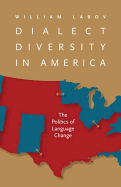
In Dialect Diversity in America, University of Pennsylvania linguistics professor William Labov details a transformation in vowel pronunciation in parts of the United States that he connects to the nation's pressing racial and political issues. He begins by debunking several popular language-related myths, including the idea that regional accents are fading due to mass media--in fact, Labov argues, differences in pronunciation across regional America are becoming more pronounced. Nowhere is this more obvious, he continues, than in the Northern Cities Shift (NCS), which has produced vowel pronunciations not heard in northern states as recently as 50 years ago. The NCS results in more tense, nasal vowels, particularly short-a sounds: those who speak with the NCS, for example, pronounce the name "Ann" so that it sounds almost identical to the name "Ian."
Labov also explores the political powderkeg that is African-American Vernacular English (AAVE), especially when it comes to using AAVE to teach reading in public schools. And he links NCS and AAVE together in a political analysis of northern states that reveals a fascinating correlation: those states in the forefront of the NCS are also those in the historical forefront of American political issues, ranging from the abolition of slavery to the abolition of the death penalty.
Dialect Diversity in America is written with non-linguists in mind, and Labov's arguments are easy to follow with or without crunching the statistical data he provides. It's an interesting introduction to linguistics as it poses the intriguing question of whether (or how) the sounds we make follow the political changes we embrace. --Dani Alexis Ryskamp, blogger at The Book Cricket

